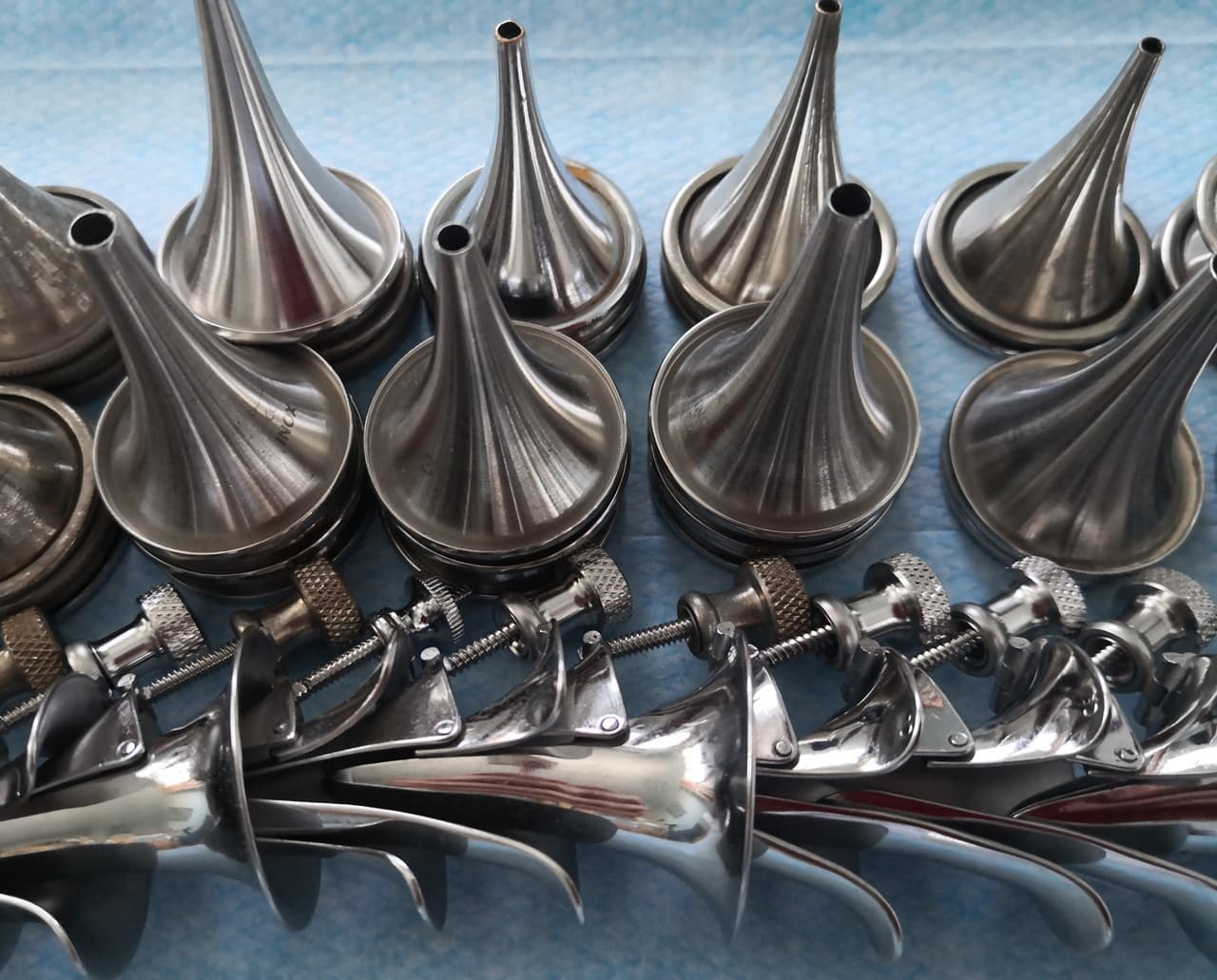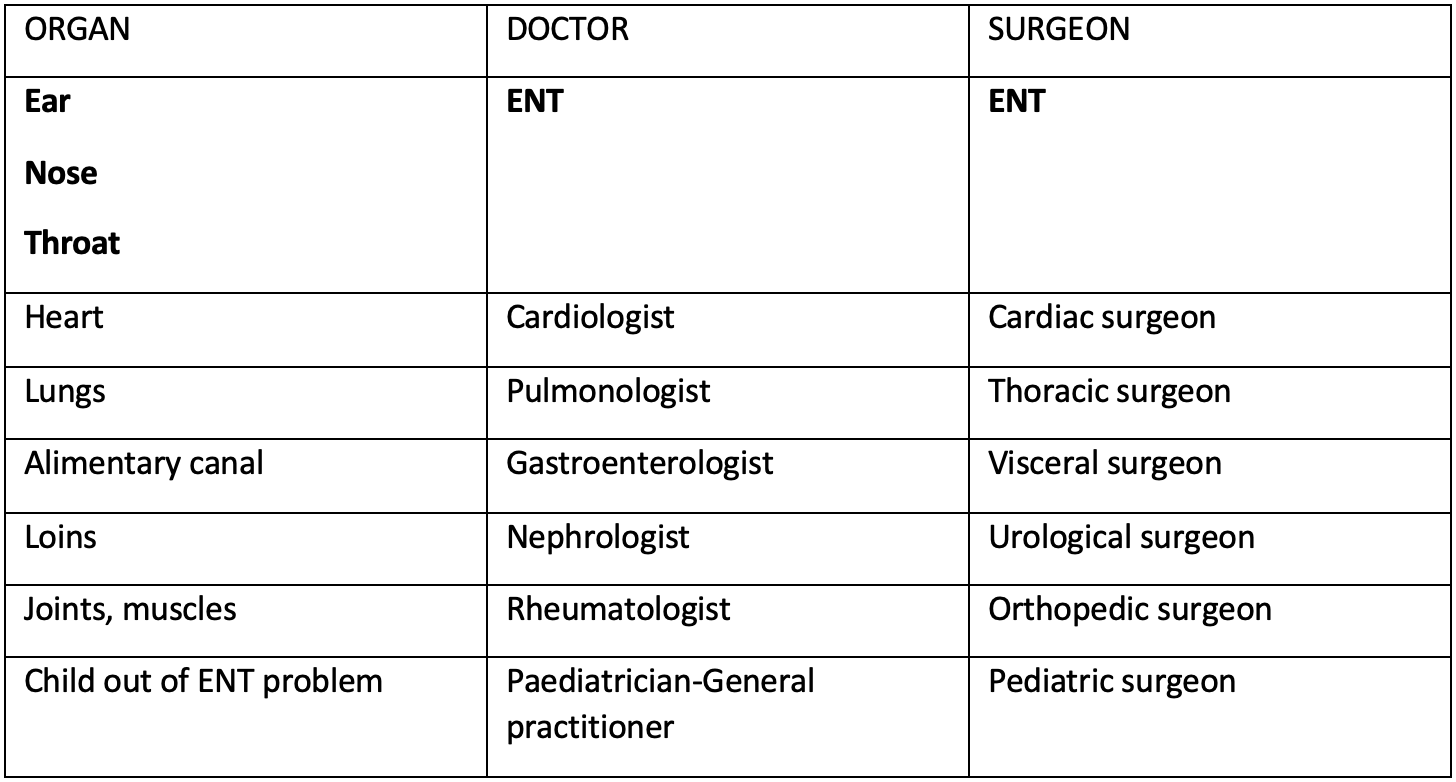What is ENT and head and neck surgery?
The meaning of the acronym ENT (E= Ear N= Nose T=Throat) (in French: Oto-Rhino-Laryngologie, so ORL)
Otology : Medical science whose subject of study is the ear and therefore particularly hearing problems and vertigo. Indeed the inner ear is the sensory organ of hearing by its part called cochlea but also participates in the balance of the body thanks to its other part called vestibule.
Rhinology: Medical science whose subject of study is the nose and more particularly the problems of the sinuses and of smell.
Laryngology: Medical science whose main subject of study is the larynx, organ of phonation (expression of speech by voice) but which has been enlarged over time to the other cavities located between the mouth, nose and esophagus, commonly called throat and pharynx (oropharynx, nasopharynx, hypopharynx).
To be more understandable to all about the skills of the ENT, the term cervico facial has been added because this specialist also takes care of problems located in the neck (cervico) and on the face (facial).
ENT diseases
The ENT sphere includes everything related to:
- Hearing
- Balance
- Breathing (upper respiratory tract)
- Smell
- Voice
- Swallowing
- Taste
- Facial expressions
The organs involved are:
- The ear (extern, middle, inner)
- The mouth with the tongue and salivary glands
- The throat with the pharynx, larynx and trachea
- Nose and sinuses
- The neck with the thyroid and parathyroid glands

Is my ENT doctor also a surgeon?
YES and it is very rare in medicine that a single specialist deals with both medical and surgical problems of the same organ but this is the case of ENT in France. This allows a global and continuous management of the pathology, from diagnosis to treatment, by the same person. In addition, the ENT can take care of both children and adults, which is also not common in the field of medical specialties, allowing it to be sustainable in the long term.
The treatments he offers are based on medecine, surgical interventions (open or endoscopic), rehabilitation, prosthetic or implantable devices.
Table illustrating the singularity of the ENT specialty

Borders and cooperation with others healthcare professionals
Because of its vast and varied practice, ENT can be required to work in areas of expertise on the face and neck shared with other specialists such as stomatologists, maxillofacial surgeons, cosmetic surgeons, dermatologists.
The ENT works closely with:
- Audioprosthetists for the supply, adjustment and adaptation of hearing aids
- Speech therapist for voice, language comprehension, swallowing disorders
- Physiotherapists for the rehabilitation of balance disorders, muscle trophicity of facial paralysis, postoperative musculocutaneous flexibility
Short historical of the ENT in France
Otolaryngology as a specialty was established in the late 1860s, when otologists and laryngologists found that they used the same means of lighting. This union took place very early in France. In 1875 appeared the first review of ENT in France, the “Annales des Maladies de l’oreille et du Larynx, (otoscopy, laryngoscopy, rhinoscopy)”. The Société Française d’Otologie et de Laryngologie was created on September 21, 1882, and was one of the very first French specialty societies. It became the French Society of Otology, Laryngology and Rhinology in 1892. The first official teaching of ENT in France was created in Bordeaux in the form of an “Chargé de cours” (duty of teaching) of ENT, in 1891 by Dr. Jules Émile Moure, one of the first ENT to exercise his activity in the three branches of the new discipline and later holder of the first university chair of ENT created in France, in 1913.
What to remember
Your ENT is both the doctor and surgeon of your face and neck problems for yourself and your child.
ENT, a specialty with ear
ENT, a specialty with balance
ENT, a specialty with voice
ENT, a specialty with taste
ENT, a specialty with smell
All these organs can be the seat of various pathologies:
- Congenital or acquired malformations
- Benign or malignant tumours (cancers) of the skin
- Infections and inflammations (angina, laryngitis, pharyngitis, tracheitis, otitis, parotiditis, submandibulitis, sinusitis etc…)
- Trauma (fractures of the nose, face) and wounds
- Migrations- piercing inclusions that can no longer be removed (lips, tongue, nose, ears)
- Bleeding-hemorrhage (example through the nose: called epistaxis)
- Paralysis (facial, lingual, laryngeal)
- Dizziness
In other words, the fields of activity of the ENT are vast and varied.
Do you have a question? Need more information?
Leave it to an ENT professional
Dr Antoine Delagranda is available to answer any questions you may have about ENT surgery. Dr Delagranda is a specialist in ENT surgery at the Clinique Saint Charles in La Roche-sur-Yon in the Vendée.
ENT consultation in La Roche-sur-Yon, Vendée
Dr Antoine Delagranda is available to answer any questions you may have about ENT and cervico-facial surgery. Dr Delagranda is a specialist in ENT surgery at the Clinique Saint Charles in La Roche-sur-Yon in the Vendée.

